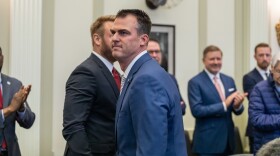Congress had just one thing to do this month before it left town for its October recess. That was to keep the government funded past Sept. 30. But with just under one week left on what was supposed to be a straightforward task, there's still no deal in sight.
There was a fantasy circulating the Senate last week — that senators would be able to wrap up business and head home three weeks early to get back to campaigning (the Senate had been scheduled to be in the first week of October as well). It was such a widely adopted fantasy, many senators had a ready explanation for why it wouldn't be worth sticking around for the rest of September after they got the spending bill done.
"I mean, I think doing anything else requires a high level of cooperation, which probably between now and November 8 isn't going to exist around here," said Republican John Thune of South Dakota early last week.
Turns out there wasn't even enough cooperation to get out of town early.
By Thursday afternoon, Senate Minority Leader Harry Reid was dismissing any notion senators were rushing to leave the Capitol.
"We're in no hurry to go any place, okay? We have all a lot of time," said Reid to a gaggle of reporters.
By the end of the week, negotiations in the Senate were deadlocked. Even in the peculiar world of government spending bills where questions like, "Will the bill run through December or next March?" count as suspenseful, the intensity of this deadlock wasn't something senators seemed to expect just weeks ago.
Where things stand now? Reid and Democrats in both chambers say the latest offer by Republicans is a no-go. So far, the only things both sides can agree on are: keeping the government open through December 9, and providing emergency aid to fight Zika without restricting funds for Planned Parenthood.
It was progress, but the latest Republican proposal also contains flood aid for Louisiana and other states – without providing any aid for the water contamination crisis in Flint, Mich. Democrat Chuck Schumer of New York says that is unacceptable.
The question is, they want to put Louisiana in, and we said you can't put Louisiana in unless you put Flint in.
"The question is, they want to put Louisiana in, and we said you can't put Louisiana in unless you put Flint in," said Schumer.
But treating these disasters as inseparable offends Republicans like Bill Cassidy of Louisiana, who says the people in Flint can be taken care of after the election. Flood victims in Louisiana, however, cannot wait that long.
"We shouldn't hold folks who right now still have mud in their house and are thinking of throwing the keys to their house on the table of their banker, because they can't afford their mortgage, hostage to other peoples' grief," said Cassidy.
There's also a squabble over a provision that would prevent the Securities and Exchange Commission from forcing companies to disclose political spending — it's current law, but Democrats want it out.
Republican Sen. Ted Cruz of Texas was leading the push for provision that would preserve U.S. control over a non-profit that oversees the Internet domain name system. But the most recent version of the spending bill proposed by Republicans didn't include it.
We're going to have a no drama moment here — a low drama — there's never no drama here. We're going to have low drama.
Yesterday he released a following statement, appealing to his colleagues in the House to continue the fight:
"I am grateful for my Senate colleagues' vigorous support during this debate," Cruz said. "I encourage my colleagues in the House to continue to stand united to ensure that the government funding bill prevents the Obama administration from permanently undermining free speech on the Internet."
The next procedural vote on the spending bill is scheduled for next Tuesday afternoon in the Senate. It remains to be seen whether a deal can be reached with Senate Democrats before then.
Meanwhile over in the House, Speaker Paul Ryan tried to sound reassuring.
"We're going to have a no drama moment here — a low drama — there's never no drama here," Ryan told reporters on Thursday. "We're going to have low drama."
Or, so he hopes. Ryan will need House Democrats to get this bill through because many conservative Republicans have already said they're voting no.
Copyright 2021 NPR. To see more, visit https://www.npr.org. 9(MDAzODUzOTQwMDEyNDk2NzQ5ODE5OTFmNQ004))








